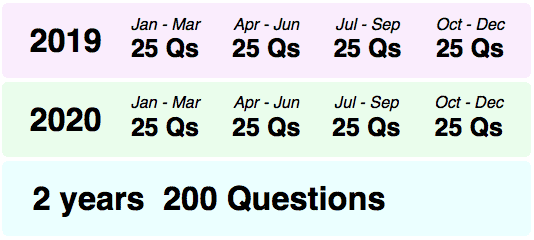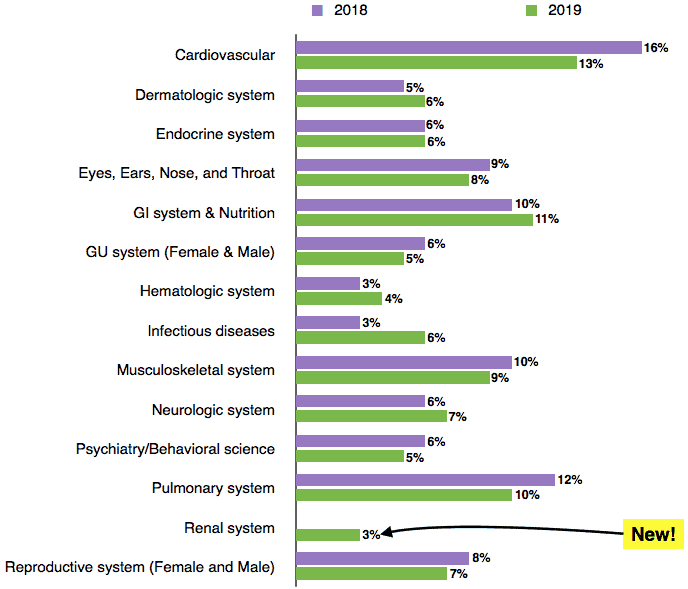Wondering if you should study for the Alternative PANRE?
That depends.
If you practice in a primary care setting, such as Internal Medicine or Family Medicine, then you are probably getting exposed to the core medical content that will appear on the PANRE Pilot. According to the NCCPA, “the PANRE Pilot will assess core medical knowledge (the knowledge all PAs should maintain regardless of their practice specialty).”
So what does core medical knowledge look like?
A 22-year-old woman is brought to the emergency department for evaluation three hours after falling backward out of a chair and striking her head on a carpeted floor. She has tenderness over the back of her head but does not report loss of consciousness. Physical examination, including neurologic and musculoskeletal evaluation, shows no abnormalities except a 2 cm area of swelling and minimal abrasion overlying the left occiput. Which of the following is the most appropriate next step?
(A) Anteroposterior and lateral X-ray studies of the skull
(B) CT scan
(C) Discharge and observation by family or friends
(D) Hospital admission for observation
(E) MRI
How confident do you feel about this question?
What about this one?
A 23-year-old White woman presents to her primary care provider reporting an unsightly mole on her left calf that has enlarged over the past 6 months. Physical exam reveals a 7 mm dark asymmetric macule with irregular borders. Which of the following is the most likely diagnosis?
(A) Acral lentiginous melanoma
(B) Lentigo maligna
(C) Nodular melanoma
(D) Squamous cell carcinoma
(E) Superficial spreading melanoma
You probably feel more comfortable with the first question than the second. Melanoma is a topic expected to appear on the Alternative Pilot as a level 1 question. Meaning, it will be presented to you as a “Which of the following is the most likely diagnosis” type of question. If you have been working in cardiothoracic surgery for the past 10 years, do you remember the characteristics of melanoma?
The general structure of the Alternative PANRE
In a given quarter, you will have approximately 11 weeks to respond to all 25 questions. Once you have opened a question, you will have a minimum of two and potentially up to five minutes to respond.

Can you skip questions? No, each question must be answered before the next question can be accessed.
Can you go back and change answers? No. You cannot change an answer to a question once it has been submitted or time for the question has run out.
Here is a recap of the structure of the Alternative PANRE:
The diseases and disorders covered on the Pilot Alternative PANRE are divided into three levels:
- Level 1: Recognize most likely diagnosis using signs, symptoms, and risks; refer appropriately
- Level 2: Make appropriate diagnosis by recognizing signs, symptoms, risks, and interpreting results of diagnostic studies and have knowledge of first-line treatment.
- Level 3: Make appropriate diagnosis by recognizing signs, symptoms, risks, and interpreting results of diagnostic studies and have knowledge of first-line treatment. In addition, have knowledge required to manage well-known comorbid conditions, contraindications, and complications.
The category differentiation differs slightly from last year:

The Alternative PANRE contains 200 questions that are derived from these categories and in approximately this distribution.
For these reasons, advance preparation may not be required, however, if you would feel more prepared by studying in advance or during the two-year PANRE Pilot period, please feel free to do so utilizing the same approaches you would have used for traditional PANRE review (self-study, practice questions, review courses, etc).
The answers to the questions above…for question 1 the answer is (C) Discharge and observation by family or friends. For question 2 the answer is (E) Superficial spreading melanoma.
So…do you need advanced preparation for the Alternative PANRE? That’s up to you. For PAs working in primary care medicine, your day-to-day clinical experience may be enough. PAs working in subspecialties, who keep up on the literature year-to-year, may have no need for advanced preparation, either.
But if you are like most PAs who are focused on your specialty area and do not spend much time outside of it…you may want to consider the Rosh Review Alternative PANRE Qbank that covers every topic listed in the NCCPA PANRE Content Blueprint. This Qbank gives you the opportunity to become familiar with the required core medical knowledge and to practice it in a low-stress environment so you can answer your Alternative PANRE questions correctly on the first try. And at the very least, you’ll gain even more skills to help you in practice.




